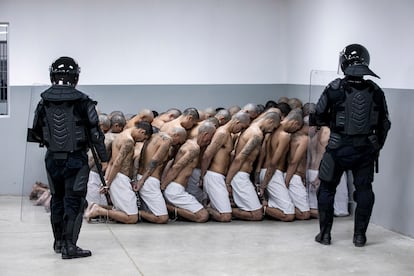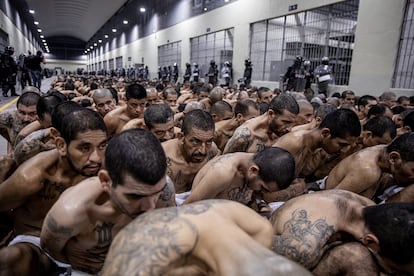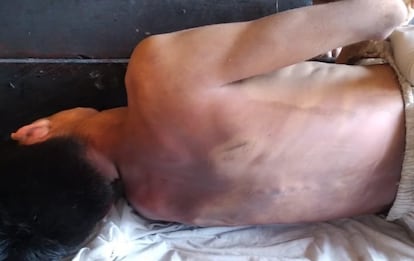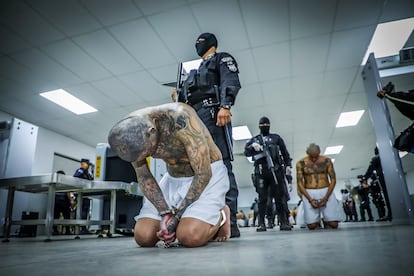Inmates in El Salvador tortured and strangled: A report denounces hellish conditions in Bukele’s prisons
Cristosal, the primary human rights organization in the Central American country, describes a regime of terror through interviews of hundreds of people who were mistakenly arrested or freed after being declared innocent

Dozens of inmates died as a result of torture, beatings, mechanical suffocation via strangulation or wounds or were left to die because of lack of medical attention. That is the primary result of an exhaustive investigation by Cristosal, the primary civil society human rights organization in El Salvador, after a year of the state of exception implemented by the government of president Nayib Bukele in his so-called “war on gangs.”
The report, published on Monday, is the clearest investigation to date. Its results are terrifying. To write it, the institution interviewed hundreds of people who were imprisoned for months during the state of exception and were freed after being declared innocent, as well as relatives of inmates who died in prison during the same period. Cristosal also contrasted the testimonies with medical forensic documents, police documents and photographs. Authorities have withheld official information and have insisted that all deaths within prisons are from natural causes.
The document presents stories from survivors who recount the torture they experienced within the prison. For exmaple, they were forced to pick food off of the floor with their mouths, given electric shocks and exposed to untreated epidemics of skin fungus.
“The massive and systemic violations are now a state policy. The suspension of rights and militarization is not an exception anymore, but a norm that affects the lives of all Salvadorans,” Noah Bullock, director of Cristosal, told EL PAÍS.
Executions in prisons
Cristal has documented the death of 153 prisoners in state custody between March 27, 2022 and March 27, 2023, all detained in the same period. Of those, 29 died violent deaths and 46 “probable violent deaths” or under “suspicions of criminality.” Since March 23, more cases of inmate deaths, which do not enter into the previous count, have been reported.
Among those 75 cases, the investigation points out as a “common pattern” the presence of lacerations, hematomas caused by beatings, wounds with sharp objects and signs of choking or strangling on the cadavers. According to the report, death by mechanical asphyxiation is one of the “most frequent” causes of death described in medical legal reports.
One of the clearest cases is that of a 30-year-old man whose dead body was given to his relatives with a protuberance on the neck. The medical documents reported that he died as a result of “mechanical asphyxiation by strangling.” The autopsy of another man, an 42-year-old who died in a police cell, determined the cause of death “mechanical asphyxiation by choking.”
Mechanical asphyxiation and immersion asphyxiation were used as methods of torture in El Salvador by security forces during the country’s civil war between 1970 and 1992. Bulock told EL PAÍS: “It is very sad to see that the state has again recurred to arbitrary detentions and torture in the name of national security.”

Other cadavers presented other signs of torture. In the case of a 32-year-old man whose body was delivered to his family, the autopsy determined the cause of death was a “severe contusion-type closed thorax trauma.” According to the report, the body had deep wounds on the elbow, blows on the forearm and a wound of approximately eight centimeters on the left side of the head.
In other cases, according to the investigation, people died due to unattended mortal illnesses or because of lack of access to medication. Such is the case of a 50-year-old woman who suffered from liver disease at the time of her detention. “Despite her family taking the medications to the prison where she was detained, they were not received, and when her family asked about her, they responded that if she needed medications, the doctor would let them know,” the report says.
Hidden numbers
The execution numbers that Cristosal reveals may be incomplete, according to the report. The investigation detected that in 39 of the 153 cases, the forensic experts did not clearly establish the cause of death. Such is the case of a 23-year-old man who died on April 18, 2022: “The cadaver presented signs of blows on various parts of the body, fracture on feet and hands, long burn-type wounds on the back, which demonstrate that hey may have been a victim of torture. The cadaver was given to the family in a closed coffin,” says the report. The coroner’s report stated that it was a “sudden death.”
The report also reveals that, in some cases, the cause of death established by the forensic doctors does not coincide with the deceased’s previous health conditions. For example, a 42-year-old woman died of “septic shock by immunosuppression caused by nasal carcinoma,” suffocation as a result of a tumor, according to the autopsy, but her family never knew that she had cancer. A 44-year-old farmer was detained for four months and died in a hospital at the end of the period as a result of “pneumonia,” according to the autopsy. He had wounds on his body, however, and he had lost so much weight that he was “unrecognizable” to his family.
Another fact that may increase the number of deaths is that some inmates are being buried in mass graves without their families being notified. Cristosal detected at least four cases: “The body of a 45-year-old man with an intellectual disability was moved to [the Institute of] Legal Medicine with different last names than those with which he was buried in a mass grave in La Bermeja Memorial Park. The medical legal obituary establishes that he died as result of a ‘pulmonary edema’; however, the forensic photographs show that the cadaver presented edemas on the face. People interviewed informed that he was beaten within the prison where he was detained, he received kicks in the stomach that caused him to expel blood from his nose and mouth, which caused him to lose mobility and not be able to eat. He did not receive medical attention,” the report says.
According to the document, one of the primary demands of inmates’ relatives under the state of exception has to do with the lack of information about their inmates’ whereabouts, effectively making them victims of disappearances that are not registered by the justice system.
Additionally, many inmates who are freed after being declared innocent leave prison in deplorable health conditions, which end up causing their deaths, as with a 24-year-old man detained in May 2022. After being detained in the prison known as Mariona for seven months, his family was notified that he was in critical condition in the hospital with stomach pains. His family found him gravely ill. Days after entering the hospital, the young man had a special trial. The judge told the family that she had two pieces of news: the good news was that the man was declared innocent. The bad news was that he now suffered from chronic renal insufficiency. Two days after being freed, the man died.

Electroshocks, beatings and punishment cells
The report also includes horror stories of ex-inmates who remained in prison for months under the state of exception and were eventually declared innocent.
According to the testimonies in the document, overcrowding, beating and mistreatment are the daily bread of the prisons of El Salvador’s state of exception.
A 20-year-old man detained in the Mariona prison recalls that a guard, known as Montaña, constantly threatened inmates with death. “You’ll leave here alive only if you’re lucky,” he would say to the prisoners. “While [inmates] kneeled, [guards] gave them electric shocks, and they drew blood from one. When they entered the area where the guards stayed, they were beaten again,” the report says.
Another type of torture within Bukele’s prisons has to do with cleanliness and the inmates’ living conditions. According to the report, “in some cases, during an entire day, they are only allowed to drink a cup of water.”
A 20-year-old man who was detained in Mariona recalled the following: “One day a guard arrived with a bucket of food and said, ‘Are you hungry?’ When they responded that they were, the guard threw the food on the floor, which was covered with mud and filth, and told them, ‘You’re only going to pick it up with your mouth, and if you grab it with your hands, I’m going to take you out and beat you.’ And he gave them five seconds to pick up the food with their mouths. We were hungry and he said that we had to eat like that, only with our mouths. Then he walked away. When he came back, the guard said, ‘The dogs were hungry.’”
That same week, foreign representatives of a human rights organization entered the prison, but a guard had warned them in advance not to complain: “Visitors are going to come tomorrow, and the first [one to speak out] about the treatment here will die from electric shocks.”
Another type of torture that the report reveals, according to the survivors, is the isolation cells. These cells “are used for whoever complains or talks at night or does not follow the guards’ instructions, sometimes without any reason,” the document says. The cells are very small. They are usually dark, and light is not visible. They do not have cots and some do not have toilets. Inmates in the cells rarely receive drinking water and are not permitted to bathe. Numerous detainees affirm that “some who go to the cells return in a state of malnutrition, or do not come out alive,” the report says.
One of the survivors recalls his experience in the cell: “They gave one meal, beans with a tortilla, first in the hand, then in a tupper. When he left there, he was taken to the Malnutrition area, where they treated them well so that they would recover and then take them to be beaten again. About 20 days after being there he had a stroke, when he woke up they took him to the hospital, his mouth was sideways, he felt trembling and tingling in his face,” the report states.

Bukele’s government has maintained a state of exception since March 27, 2022, as a response to gang violence. The measure was adopted after MS-13 and Barrio 18, the two largest gangs in the country, organized a massacre that left 87 dead in the streets in just one weekend. According to journalists’ investigations, the massacre was due to a rupture of the pact that Bukele had with the gangs since the beginning of his administration, which kept the violence low.
Since its beginning, the state of exception has been criticized by national and international human rights organizations, not only because of the arbitrariness of the measure being extended beyond what the law allows, but also because in practice, it permits the systemic violation of human rights.
Bukele has responded to critiques dismissing anyone who questions his measures, and has called human rights organizations “gang defenders.” However, reality demonstrates that not all of the almost 67,000 detainees are really gang members. At least 5,000 of them have been freed, according to authorities.
For human rights defenders, the measure takes El Salvador back to the past. “In Salvadoran history, states of exception are not a novelty. They are the preferred instruments of social control and political repression of the military dictatorships of the past. [The situation today] is a concerning and painful familiar scenario from the darkest eras of Salvadoran history. Self-censorship is clear. People do not talk anymore. All Salvadorans know that any encounters with a police officer could end up in being captured and tortured to death,” Bullock said.
Sign up for our weekly newsletter to get more English-language news coverage from EL PAÍS USA Edition
Tu suscripción se está usando en otro dispositivo
¿Quieres añadir otro usuario a tu suscripción?
Si continúas leyendo en este dispositivo, no se podrá leer en el otro.
FlechaTu suscripción se está usando en otro dispositivo y solo puedes acceder a EL PAÍS desde un dispositivo a la vez.
Si quieres compartir tu cuenta, cambia tu suscripción a la modalidad Premium, así podrás añadir otro usuario. Cada uno accederá con su propia cuenta de email, lo que os permitirá personalizar vuestra experiencia en EL PAÍS.
¿Tienes una suscripción de empresa? Accede aquí para contratar más cuentas.
En el caso de no saber quién está usando tu cuenta, te recomendamos cambiar tu contraseña aquí.
Si decides continuar compartiendo tu cuenta, este mensaje se mostrará en tu dispositivo y en el de la otra persona que está usando tu cuenta de forma indefinida, afectando a tu experiencia de lectura. Puedes consultar aquí los términos y condiciones de la suscripción digital.








































